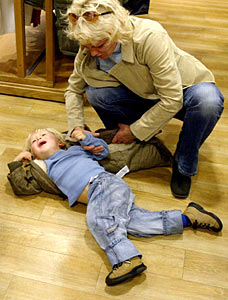
March 24, 2011. Cincinnati. Ten fathers of children with developmental disabilities and 2 male behavior specialists sat around a table on Friday evening waiting to hear what I had to say about being the father of an adult child with autism. They were wondering out loud what it would be like. Only a few had ever been to such a gathering. 10 out of 10 had children on the autism spectrum ranging in age from 6 to 24. Before the discussion began I told them that nothing they said would be wrong. They seemed relieved; then I invited them to share their experiences.
No accident that “When I hug my son, he doesn’t hug me back” resonated in the hearts of these men. Autism at its core is a social disorder of relating and communicating. Mothers have the same heartbreaking moments. It’s just that fathers are far less likely to verbalize their experience.
It’s a stereotype that children and adults with autism don’t connect. But they are not easy to bond with. Another father pointed out that his 7 year old son connects in some ways and not others. This was a rare opportunity for fathers to bond with each other and experience a sense of fellowship.
It felt good to be able to create that space for men by sharing bits of my own journey. Some of their children are nonverbal, some speak slowly, and others can’t stop talking. As one father mentioned his son who is slow to speak forces others to slow down. Because our children connect and speak differently, we have to pay attention closely. They actually engage us in a different way.
The men talked about their struggles and what they are learning. For example, the type of discipline many of their fathers used with them just didn’t work. Some spoke of “belt lessons” they received, and others described the shame they felt when not meeting their fathers’ expectations.
Then I guided them in a discussion of what they are learning. One man shared how he was still learning to be a father after 5 years. Others were finding they couldn’t shape their children into who they had expected them to be. They were making new dreams. Yet they worried about the future. Could their children ever live on their own? If not who would look after them?
Sharing that he was never known for patience, another man spoke of how much more patient he was becoming with his son who “speaks in slow motion.” One 18 year old still loves to wear Barney t-shirts. His dad finds sweetness and innocence in that but worries about him being targeted by bullies.
Finally we discussed things they enjoy doing with their sons and daughters. Some weren’t sure, so I just encouraged them to search and explore for those moments which might not be planned. Another man shared how he had decided to take his son who is nonverbal with him on a Saturday morning while doing errands. He enjoyed having his boy along, but he wasn’t sure if his son actually liked it.
Warm memories of riding with his own dad opened up because he had really enjoyed that one-on-one time as a kid. When he got home, he wrote on his Facebook about having a good time doing errands with his son. Several friends wrote back saying they too loved doing errands with their dads. He had stumbled on happiness with his son.
My approach was not about replacing negative thoughts with positive thoughts. It wasn’t about sugar coating their often exasperating lives. It wasn’t ranting about the injustice of it all, although that was allowed to happen freely. I tried to help them find a balance so they can be honest about their frustrations and their sorrows which come and go while also seeing and feeling the moments full of meaning and happiness which also come and go. This is what it is like to be a father or a mother of a child with autism. But even more this is what it’s like to live.


